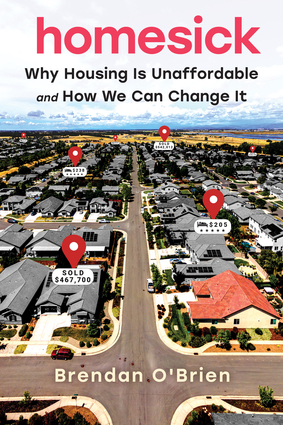Overview
Nobody who sits in traffic on Sedona, Arizona’s main stretch or stands shoulder-to-shoulder in its many souvenir shops would call it a ghost town.Neither would anyone renting a room for $2,000 a month or buying a house for a half-million dollars. And yet the people who built this small town and made it a community are being pushed further and further out. Their home is being sold out from under their feet.
In studying the impact of short-term rentals, Brendan O'Brien saw something similar happening in places ranging from Bend, Oregon, to Bar Harbor, Maine. But it isn't just short-term rentals, and it's not just tourism towns. Neighborhoods in Austin and Atlanta have become rows of investment properties. Longtime residents in Spokane and Boston have been replaced by new, high-salaried remote workers. Across the country, a level of unaffordable housing that once seemed unique to global cities like New York and San Francisco has become the norm, with nearly a third of all US households considered housing cost burdened.
This situation has been abetted by the direct actions of developers, politicians, and existing homeowners who have sought to drive up the cost of housing. But it's mostly happened due to a society-wide refusal to see housing as anything more than real estate, another product available to the highest bidder. This trend of putting local housing on a global market has worsened in recent years but is nothing new. Housing in the United States has always been marred by racial and income inequality that mocks the country’s highest ideals.
Deeply researched and deeply felt, Homesick argues that we can be so much better. And we can start where we live.Reviews
"Blending historical and contemporary insights into a compelling narrative,
Homesick presents a clear-eyed, engaging account of what caused the housing crisis and what we can do about it. A timely and beautifully written book." —
Brian Petersen, coauthor of
Climate Change Solutions: Overcoming the Capital-Climate Contradiction"Read this book if you want to understand—as we all urgently need to understand—why housing access in the United States is ever more inaccessible to those who seek stable and affordable places to call home.
Homesick is erudite but utterly approachable and engaging, and somehow both friendly and furious. But why wouldn’t his fury be friendly? He’s furious on your behalf. And on behalf of his friends. And an entire generation of millennials who have been priced out of housing security.
Connecting contemporary afflictions such as the impact of COVID-19, gentrification, and ballooning student debt with factors more wide ranging—settler colonialism, anti-Blackness, capitalism—O’Brian links our current moment to long histories of the divide between those who can afford to view housing as capital and those who view housing as a home." —
Jessi Quizar, School of Urban Studies, University of Washington - Tacoma
"A
deeply researched, insightful look at the housing crisis, and what it means when we view homes as investments. If you've ever wondered why trying to afford this basic human need is so difficult,
Homesick will make you feel furious, guilty, and hopeful about the state of housing as a human right." —
Blythe Roberson, author of
America, the Beautiful?Impressively well researched, written, organized and presented,
Homesick: Why Housing Is Unaffordable and How We Can Change It by Brendan O'Brien is a seminal, groundbreaking, eloquent, and informatively fact laden contribution to our present national dialogue with respect to homelessness and the crisis of inadequate affordable housing in America. —
Midwest Book ReviewAuthor Biography
Brendan O’Brien spent three seasons working for federal public land management agencies in California, Montana, and New Mexico. He observed the influx of short-term rentals and non-primary homes alongside rising rents and prices. Studying this link became the basis of his master’s thesis from Northern Arizona University as well as the article “When Boom Towns Become Ghost Towns in the New West.” He lives in Flagstaff, Arizona.
 Mother's Day
Mother's Day Father's Day
Father's Day
